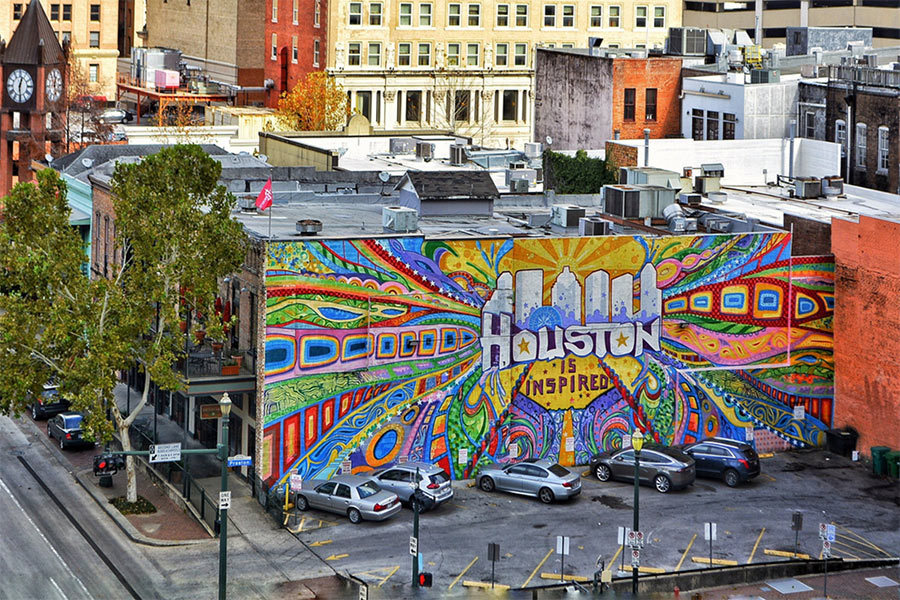
- Owner of Greenway Plaza, Phoenix Tower Selling Nearly Half of its Interest in the Properties for $512.1M [Houston Chronicle ($)]
- Office Tenants Seeking Close Proximity to Shops, Restaurants, Gyms [Houston Chronicle ($)]
- La Marque Saw the Greatest Growth in Average Sales Price, Transactions Last Month, Finds HAR [Houston Chronicle]
- Single Women Can Not Afford To Buy a Home in Houston, Finds RentCafe and PropertyShark Study [Culturemap]
- Snooze, an A.M. Eatery, Signs Lease at La Centerra at Cinco Ranch, Will Open Later This Year [Houston Chronicle]
- Grilled Chicken Chain El Pollo Loco Expands to Webster [Houston Chronicle]
- Texas Catfish Restaurant Flying Fish To Debut Later This Year in the Former Houston Tire Shop in the Heights [Houston Chronicle]
- German Grocer Lidl Planning Pearland Location in Addition to League City [HBJ]
- Work Underway for Potential June Opening on Galveston County Amusement Park Called Adventure Pointe with Year-Round Outdoor Ice Rink [Houston Chronicle]
- Slideshow: Inside Downtown Private School Incarnate Word’s $15M Expansion [HBJ]
- Evelyn’s Park in Bellaire Slated to Open on April 22 [HBJ]
- Houston Drivers Wasted an Average of 51.6 Hours in Traffic Last Year, Finds Study [Click2Houston]
- Houston Falls in TomTom’s Latest Congestion Rankings as Job Losses Helped Ease Traffic [Houston Chronicle ($)]
- Why Houston Remains Segregated [Texas Housers]
- How One Houston Homeowner Made Her Townhouse Flexible for Short- or Long-Term Paying Guests [Marketplace]
- Traffic Signal at Westcott and Memorial Misspells Street’s Name as ‘Westscott’ [Houston Chronicle]
Photo of Bellaire: Russell Hancock via Swamplot Flickr Pool
Headlines





Re: Single Women Cannot Afford to Buy a Home in Houston
.
I’m glad the article noted that single men were barely able to buy a home, too. But, as a homeowner, I don’t really understand the high emphasis on home ownership since maintenance (and saving the dollars for this) is another chore to the list. Luckily, I have enough discipline to save up for these things.
.
My main driver is “rent” stability: apartment rental renewals come up too often for my taste (at usual one-year intervals). If I could lock in a 3-year rate, I’d be more likely to rent than own.
Re Texas Housers article: I stopped reading when I got to the sentence about street lights. Apparently, in the past, denying poor people street lights was a bad thing, but now, according to the Urban Edge article that appeared here a few days ago, putting too many street lights in poor people’s neighborhoods is a bad thing.
And regarding single female homebuyers, the average home is built family-size, intended for 2-4 people or more. Why should we think that the average single person should be able to afford the average family-sized house?
.
If you were to say that the average family of four could not afford the average family-sized house (not the average NEW family-sized house, but the average family-sized house on the market), then that would be more interesting and concerning.
Who the hell wants to eat catfish from Buffalo Bayou?!?!?!?
Why does Houston remain segregated? If only there was an article to explain this to me.
@Scarlet Fever, limts you on housing stock, age and options, but typically renting from landlords in their personally owned properties can make rent increases rare and very modest if and when they do occur. In Houston’s current state I’d be surprised if many landlords wouldn’t accept 3-yr rentals. My rent increases have always been far less than property tax rate of increase.
.
@googlemaster, I’d say the reasoning to at least WANT (not saying it’s feasible) to keep housing affordable for singles is that otherwise you tremendously limit the location and housing stock for them. If they’re restricted on purchasing options then they’ll just move on to somewhere else that provides greater diversity in housing for them.
.
Also, I thought we’ve long since passed the point where the avg family of 4 cannot afford the average family sized house in Houston? Thus all the growth in the exurbs.
Re: Single Women Cannot Afford to Buy a Home in Houston
.
Are they looking at all neighborhoods of Houston or just Heights, Midtown, Washington, etc…. You can get a decent 150k to 200k home in some less desirable neighborhoods.
RE: Westcott, “The sign was made by a contractor”… who almost certainly followed the Large Sign Detail sheet which was in the plans for that particular package of signal replacements. Find whoever put their seal on that plan sheet and have a sit-down with them about including typos in their QA process.
The catfish article made me Verp (Vomit burp). I have to agree with SBV, who wants catfish from Buffalo Bayou!?! I’ll pass.
Why does Houston remain segregated?
.
Jeez, that’s a deep and convoluted rabbit-hole. But…we need to be honest with ourselves and also ask why poor populations *also* segregate themselves by ethnicity. Why is there a separation between black communities and Hispanic communities? Why do El Salvadorians cluster in Gulfton, but not the East End? Poor is poor. Poor people *could* move around within any of the poor neighborhoods well enough, so why not? The pattern which prevails in the United States is certainly not limited to its sovereign borders; western expats in non-western cities tend to cluster in a handful of neighborhoods which are not otherwise very remarkable except for the presence of other westerners; and these communities often snowball into destinations for western tourists. The same dynamic plays out in southwest Houston’s non-western immigrant communities.
.
I would posit that most people want a sense of belonging in a community and don’t want to feel alienated. By and large, poor white folks don’t stick around the trailer parks in Channelview if they become wealthy; and poor black people won’t stay in the 5th Ward. I hate to use this phrase because it is historically loaded, but people from each and every cross-section of society tend to “know their place” — and seek it out. It is not so often from fear, I think, but more often for comfort.
.
Now if anything, that is the problem. If people get it in their head that some path is closed to them, then they won’t even consider it as an option. Likewise, people can get sucked into lifestyles and careers that are favored within their community without considering other options that may be better-suited to their aptitudes and interests. Although less tragic, the same self-limiting patterns affect the most established and enfranchised segments of society. I think we all suffer from it. I’d even admit that I think that I have.
.
That doesn’t excuse the legacy of slavery or of the Jim Crow era. It doesn’t excuse the selfish actions of local or state politicians across every constituency. It does not excuse the constituents themselves when they are bigoted or simply indifferent. We need to be aware of that and we must resist it, and I think that this article is written in terms that are far too polite. But we also cannot ignore our own nature and the intractability of problems involving segregation. We all have built up the city and the governance that we collectively deserve, and it is discordant as a matter of course.
That Texas Housers link is trash.
For as long as we embrace school inequality, we embrace segregationism.
.
Doesn’t have to be racial. Everybody hates poor people and their kids.
Houston is segregated because money is segregated. The poor parts of town I visit are the most racially integrated. The one common factor among all of the people living there is that they are poor. Poverty welcomes all races in America. Wealth, not so much.
@joel – It works (perhaps more commonly) the other way around: For as long as we embrace segregationism, we embrace school inequality.
Instead of pumping money into low income developments, why not take the money and invest in the public schools making them stellar examples of public education. Attracting and paying top notch teachers who actually love to teach and not just doing it because its a job. Children are the future and it only makes sense to invest in something that can have such a profound long term result and benefit society as a whole. Eventually the neighborhoods zoned to these schools will become integrated but by then, these children will have already been set up for success and hopefully the cycle of inequality begins to break apart.
@ houcynic: If you parse out the performance of Texas schools by ethnicity, actually we don’t do a bad job at education at all. We’re in the top echelons for whites, blacks, Hispanics, and for the poor. It only seems like we rank poorly because the demographics of our children are skewed. We also spend less money on education than nearly any other state. There is very little correlation in general between money spent on schooling and children’s academic performance.
.
Moreover, the affordable housing is federally subsidized even if it is administered by the state and municipalities. Also, the City of Houston is not Houston ISD. This isn’t the sort of thing where money can just be shifted around; we can decide between potholes or parks but not between the HHA and HISD.